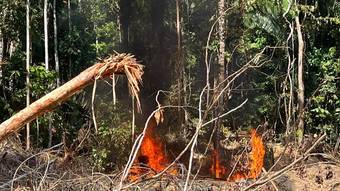The Brazilian government, along with 16 other countries, signed a declaration criticizing the anti-deforestation law approved by the European Union in June this year. The standard stipulates, among other points, that members of the European bloc must import products such as soy, wood, coffee, cocoa, beef and rubber from places with no recorded deforestation as of 2021.
The letter was signed by Brazil, Argentina, Bolivia, Colombia, Ivory Coast, Ecuador, Ghana, Guatemala, Honduras, Indonesia, Malaysia, Mexico, Nigeria, Paraguay, Peru, the Dominican Republic and Thailand. The document was sent to the President of the European Commission, Ursula von der Leyen, the President of the European Council, Charles Michel, and the President of the European Parliament, Roberta Mitsola.
• Share this news on WhatsApp
• Share this news on Telegram
Brazil says the EU law has a “punitive and discriminatory character” and asks the European bloc to “maintain an effective dialogue with producing countries, with the aim of avoiding disruptions in trade and an excessive burden on producers of agricultural goods and their derivatives covered by the agreement.” Measures”.
“From the Brazilian point of view, European law, in addition to being inconsistent with the principles governing international trade and with multilateral understandings on climate and biodiversity, presents errors and imbalances in the economic, social and environmental aspects of the problem it aims to address,” the Brazilian government says. Effective guarantee of sustainable development.
“This legislation ignores the local conditions and capacities, national legislation and certification mechanisms of producing developing countries, as well as their efforts to combat deforestation and commitments made in multilateral fora, including the principle of common but differentiated responsibilities,” the countries stated in the declaration. “.
The document also says the law “creates a unilateral risk assessment system that is inherently discriminatory and punitive, and may not be consistent with World Trade Organization obligations.” [Organização Mundial do Comércio]”.
“The EU must correct its legislation, or at least, seek to mitigate its most harmful effects through implementation guidelines that appropriately value sustainable local practices in agricultural value chains, both those already in place and those in the development stage.” The letter stated: “Avoid trade disruptions, including excessive administrative burden related to geolocation, tracking requirements, certification and customs control.”
Agreement with Mercosur
Last Wednesday (6), Foreign Minister Mauro Vieira cited EU anti-deforestation legislation and said that Mercosur expects “flexibility” in the sanctions the European bloc expects in the event of non-compliance with environmental targets within its borders. The scope of the trade agreement between the two international blocs.
According to Vieira, Brazil and the other members of Mercosur (Argentina, Paraguay and Uruguay) are committed to preserving the environment, and the European Union should reconsider the sanctions it may impose on South America.
“The European Union recently approved legislation on deforestation that would impose a series of sanctions if Brazil and the Mercosur countries do not adhere to certain European standards. What we want is flexibility of this legislation and the conclusion of agreements on the application of this legislation. Taking into account that Brazil has, as of “January 1, a very clear environmental policy to preserve the Amazon region, completely end deforestation by 2030 and restore degraded lands.”

“Music fanatic. Professional problem solver. Reader. Award-winning tv ninja.”







More Stories
Ibero-American politicians and artists demand the release of Jorge Glass
Insects that can eat and digest plastic
5 dog breeds that no TikTok vet would ever have at home